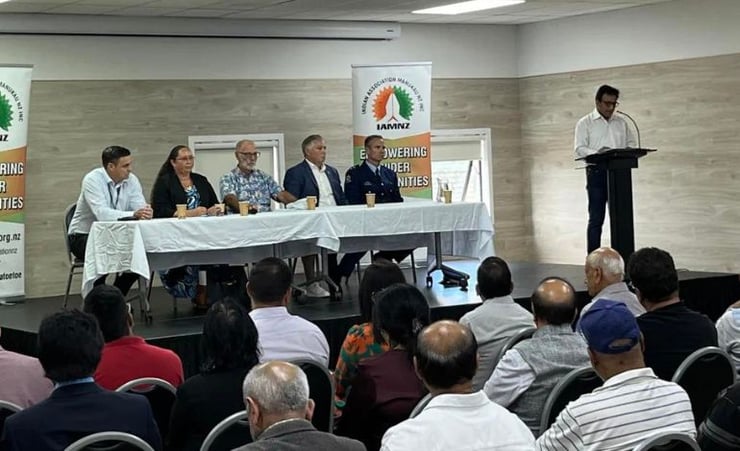Retail Crime: Indian Businesses Call For Police Task Force

Indian community business associations, retailers and community leaders have called on the government to create a national police task force that is focused solely on violent retail crime and aggravated robberies.
The task force was one of four demands submitted to Police Minister Mark Mitchell at a public meeting on retail crime in Auckland's Manukau district on Saturday.
Other demands included the appointment of a police commissioner with a proven track record of reducing ram raids and retail crime, and the establishment of an independent autonomous body to advocate on behalf of the community and retailers.
In addition, the community has called on the Police Association to document what frontline police needs to prevent ram raids and retail crime.
Associate Justice Minister Nicole McKee and Auckland Mayor Wayne Brown also attended the meeting.
Representatives from New Zealand Police also attended, including the district commander for Counties Manukau, Superintendent Shanan Gray, and manager of the Police National Retail Investigation Support Unit, Matt Tierney.
Sunny Kaushal, chair of the Dairy and Business Owners Group, who organised the gathering, noted the meeting was necessitated by a "distressing and continuing spate" of violent retail crime and aggravated robberies.
"Early this year, I was contacted by our community to organise a protest, Kaushal said. "Instead, we thought of having this public meeting first so that decision-makers on the crime affecting us all understand our desire for change. We are angry, as a change in government hasn't resulted in retail crime statistics trending towards zero."
Similar sentiments were shared by members of the community throughout the afternoon.
Himanshu Parmar, the ACT Party's election candidate for Hamilton East in 2023 and a victim of violent retail crime himself, acknowledged the frustration prevalent in the Indian community.
"Unfortunately, elections have come and gone," Parmar said. "But the criminals simply do not care and are largely carrying on their ram raids and aggravated robberies, while finding new unique ways to terrorize communities."
Jaspreet Kandhari, general secretary of New Zealand Indian Business Association, was even more blunt in his assessment of the situation.
"(It) is no secret that the Indian community by and large voted for the National Party in the last election, and the single most important issue for us was the promise of controlling violent retail crime," Kandhari said. "A few decades back, New Zealand faced the epidemic of bank robberies, which was ended by the authorities. Likewise, we want this government to give us the timeline (through) which the epidemic of aggravated robberies and violent retail crime will end."
Dhansukh Lal, president of the Auckland Indian Association, highlighted the mental trauma and insurance costs faced by victims of violent retail crime.
Jithin Chittibomma, chairperson of the Sandrigham Business Association, claimed the government had "misplaced priorities".
"Why is the government spending so much money on the firearm register?" Chittibomma said. "This money can be better used in preventing violent retail crime and supporting the victims."
Navtej Randhawa, the National Party's election candidate for Panmure-Ōtāhuhu in 2023, said business owners would leave in droves unless the government took steps to rein in offending.
"Our businesses have been robbed three times at gun point," Randhawa said. "Especially for the last two years, our community has been at the forefront of this epidemic. If the new government doesn't do anything soon, there will be mass immigration to Australia. People will simply shut shop and leave."
Retail crime victims Suresh Patel and Ghouse Majeed also addressed the gathering, calling on the government to act quickly.
In response, Mitchell and Mckee spelled out the measures the coalition government had introduced to reduce violent retail crime and ram raids.
Mitchell assured the community that the government was listening to concerns with urgency.
"I want more police on the beat again," Mitchell said. "They should be highly visible, meeting you regularly and ensuring your safety. But change won't happen overnight."
In a letter to Police Commissioner Andrew Coster that outlined his expectations, Mitchell wanted police to work closely with Oranga Tamariki and other agencies to ensure youth offenders had pathways and targeted support to avoid a life of crime.
"I expect police to continue a strong focus on targeting youth crime, in order to ensure violent youth offenders can be held accountable for their actions through the broader youth justice system," the minister said in the letter.
Mitchell also repeated National's election promise to establish military academies for young offenders.
The pledge aims to target repeat offenders by creating a new young serious offender category for those aged 10 to 17 who had committed at least two serious offences, including ram raids, armed burglary or serious assault. The category lasts for two years and can carry consequences such as electronic monitoring, community service or being sent to military academies for young offenders.
"I hear cases of young offenders being involved in over 20 ram raids. With these academies in place, they would have been inside after two and we could have prevented the next 18 ram raids," Mitchell said.
"I acknowledge the importance of community voice, which needs to be formalised," he said. "Very soon, we will put a mechanism in place so that regular interactions between businesses and government officials start happening."
McKee, meanwhile, highlighted the government's decision to no longer fund the cultural reports used in sentencing.
"Restoring law and order was a big part of our 100-day plan, of which four weeks are still left," she said. "Our government is committed to ensure real consequences for crime, and you will see more changes in the next few months."
McKee also told Karmjit Singh, a small business owner, that she was looking into clarifying the laws around self-defence.
Singh, a member of the Dairy and Business Owners Group, had asked the government to provide some guidance on how best to defend themselves against aggravated robberies.
Kaushal then doubled down on calls for the government to act urgently.
"Today, we have sent a clear message to the new government that we want a zero-tolerance approach to violent retail crime," he said. "We want offenders to suffer consequences no matter their age. We want them out of our communities if they cannot abide by the law. And we need this to happen before more murders and injuries are committed."




